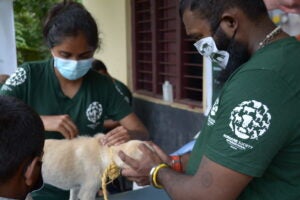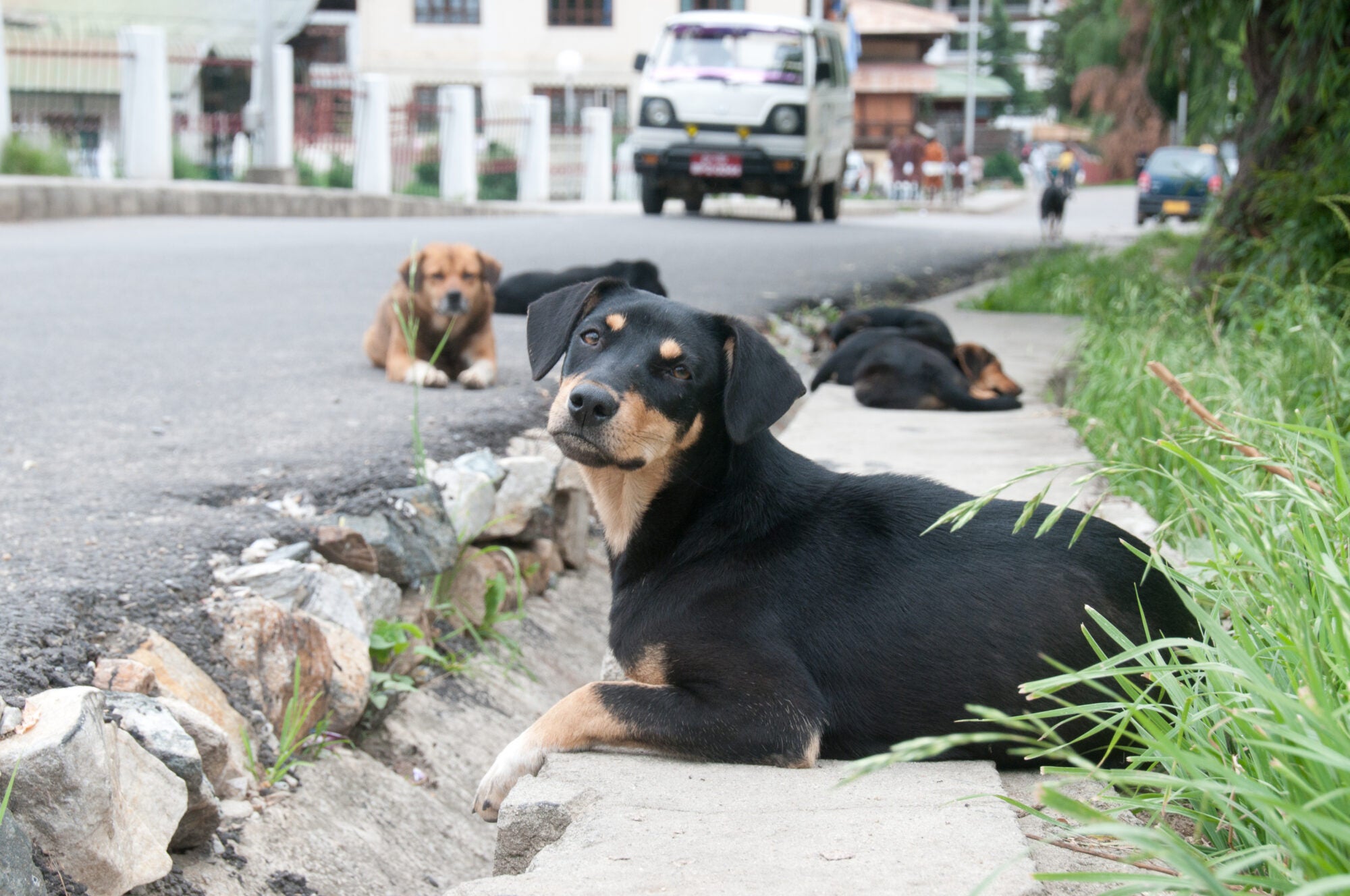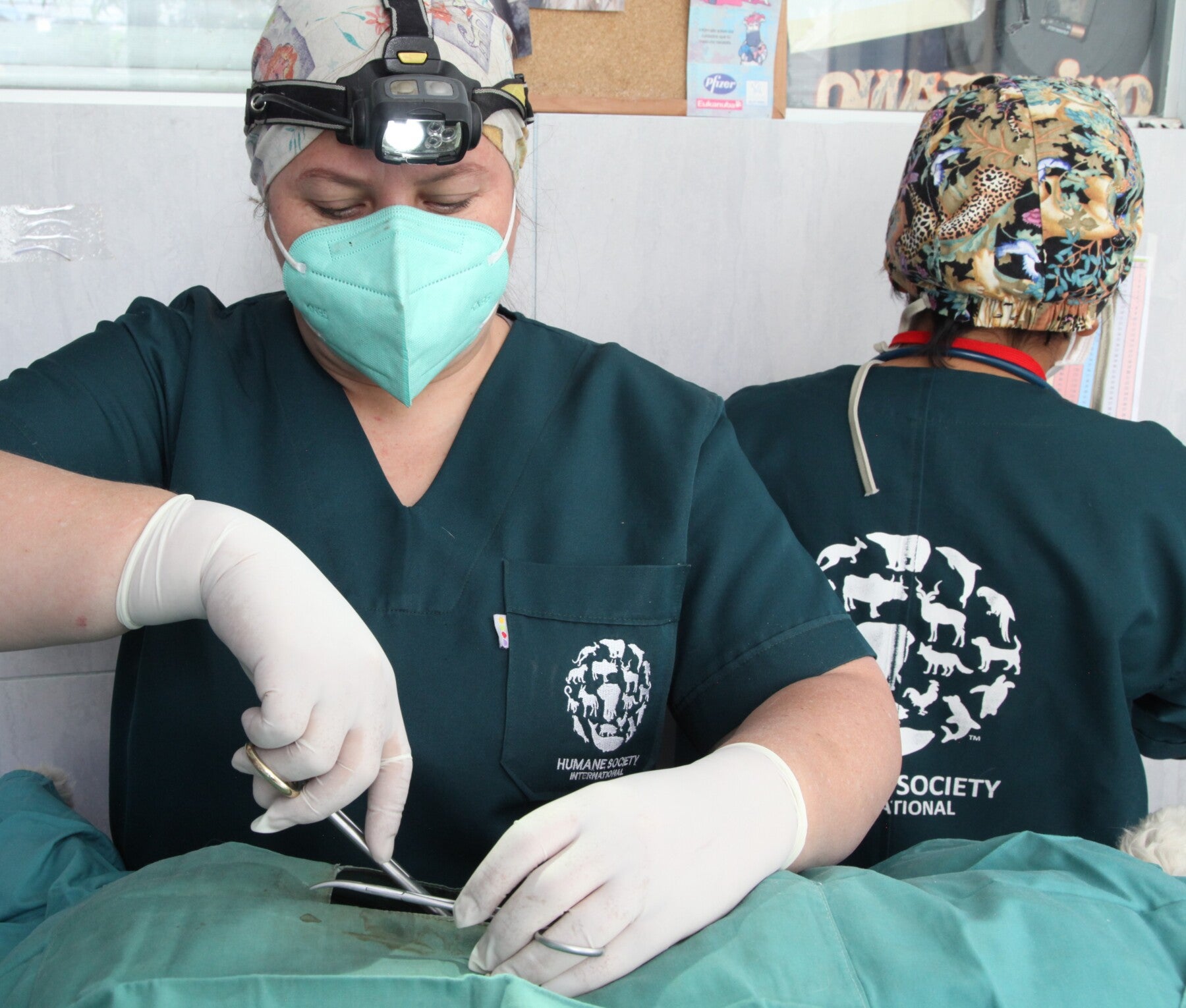
DHARWAD—Veterinarians from Humane Society International/India went door-to-door in the remote villages of Dori and Dopenatti in Dharwad, southwest India for World Rabies Day, giving free anti-rabies vaccinations to owned, yet free-ranging dogs as part of a regionalised drive to better protect both people and animals. Arriving in HSI/India’s Mobile Animal Clinic (a truck converted into a veterinary clinic on wheels) and armed with cell phones to create a medical record and track every vaccinated dog with high-tech accuracy, the vets hope to vaccinate at least 70% of the local dog population, a minimum needed for herd immunity. HSI/India teamed up with government vets from the Animal Husbandry and Veterinary Sciences Department to roll out the vaccinations.
India has around 20,000 human rabies deaths a year, accounting for nearly 40% of the worldwide death toll. Virtually all cases in India are linked to dog bites, so a three-pronged solution is vaccinating dogs, raising awareness in people on responsible canine care giving, and humanely reducing the roaming dog population. Since 2013 HSI/India has vaccinated and sterilised nearly 400,000 dogs and cats across India, and more than 1 million street dogs globally as part of its campaign to help communities reduce and care for roaming dogs and provide a humane alternative to cruel dog culls.
Dori and Dopenatti border a forest reserve and it’s not unusual for the community’s 80 or so dogs to wander into the forest. Nearly all dogs in the villages are owned by people but are entirely free-ranging. That presents the dual risk of unvaccinated dogs infecting wildlife with rabies, or acting as vectors and bringing back pathogens to the community. The rabies drive safeguards the community, wild animals around it and its dogs.
Dr. Vineeta Poojary, HSI/India’s veterinary sciences manager, says: “One of the primary drivers of deliberate cruelty faced by street or community dogs is the fear of being bitten and of contracting rabies. Roughly 20,000 people a year die of rabies in India, and most rabies cases in humans are the result of a dog bite, so by protecting the health of the dogs with a simple vaccine, we are protecting these communities at the same time. The biggest challenge though is in making communities aware of the need to vaccinate their dogs.
When we first vaccinated dogs in Dori last year, vaccination was a totally alien concept to this community and there was considerable scepticism. But now that they understand the importance of the rabies vaccine and have seen that their dogs are unharmed by it, their hesitancy has reduced significantly. Community buy-in is absolutely essential for rabies programs to work, which is why we focus so much on community engagement and education. Efforts such as these serve as the foundation to build long-term disease monitoring and surveillance programs at a district level as they enable us to collect samples from a mosaic of landscapes and species to build a robust disease profile of the region overall. Models such as this will go a long-way in ensuring animal health, community health and in-turn, planetary health.”
Globally an estimated 300 million dogs live on the streets, 35 million of them in India where they battle starvation, untreated disease and injuries, as well as direct persecution. Despite this, through community education programs such as that promoted by HSI/India, there is a growing understanding of safe and harmonious coexistence, and a growing responsibility in communities to care for the animals with whom they share their lives while at the same time holding local government agencies to account to deliver coordinated, quality veterinary care in rural and urban areas in line with the One Health approach. HSI/India’s program in the district of Dharwad, Karnataka aims to develop a model for inclusive animal protection, actively engaging community members to sustain these efforts over time.
Local resident Allah Baksh (37 years old) says: “My dog’s name is Pinto and he is 3 years old. I am a member of the grama panchayat (village administrative unit). Members of HSI/India and government doctors have come today and vaccinated almost all dogs in our village. This is a really good initiative to safeguard the health and wellness of our dogs and the people in our village. We welcome this program and have fully cooperated with them. We would also like to get our dogs sterilized in the near future.”
Local resident Bhimappa, (65 years old) says: “My dog’s name is Raja and he is 6 years old. Since this morning, the vets have been going door-to-door and vaccinating all dogs in our village. This is very beneficial to our dogs and people who live in Dori. This initiative is one of a kind and is welcome from the point of view of health of our animals.”
ENDS
Media Contacts:
- India: Shambhavi Tiwari: stiwari@hsi.org
- UK: Wendy Higgins: whiggins@hsi.org


